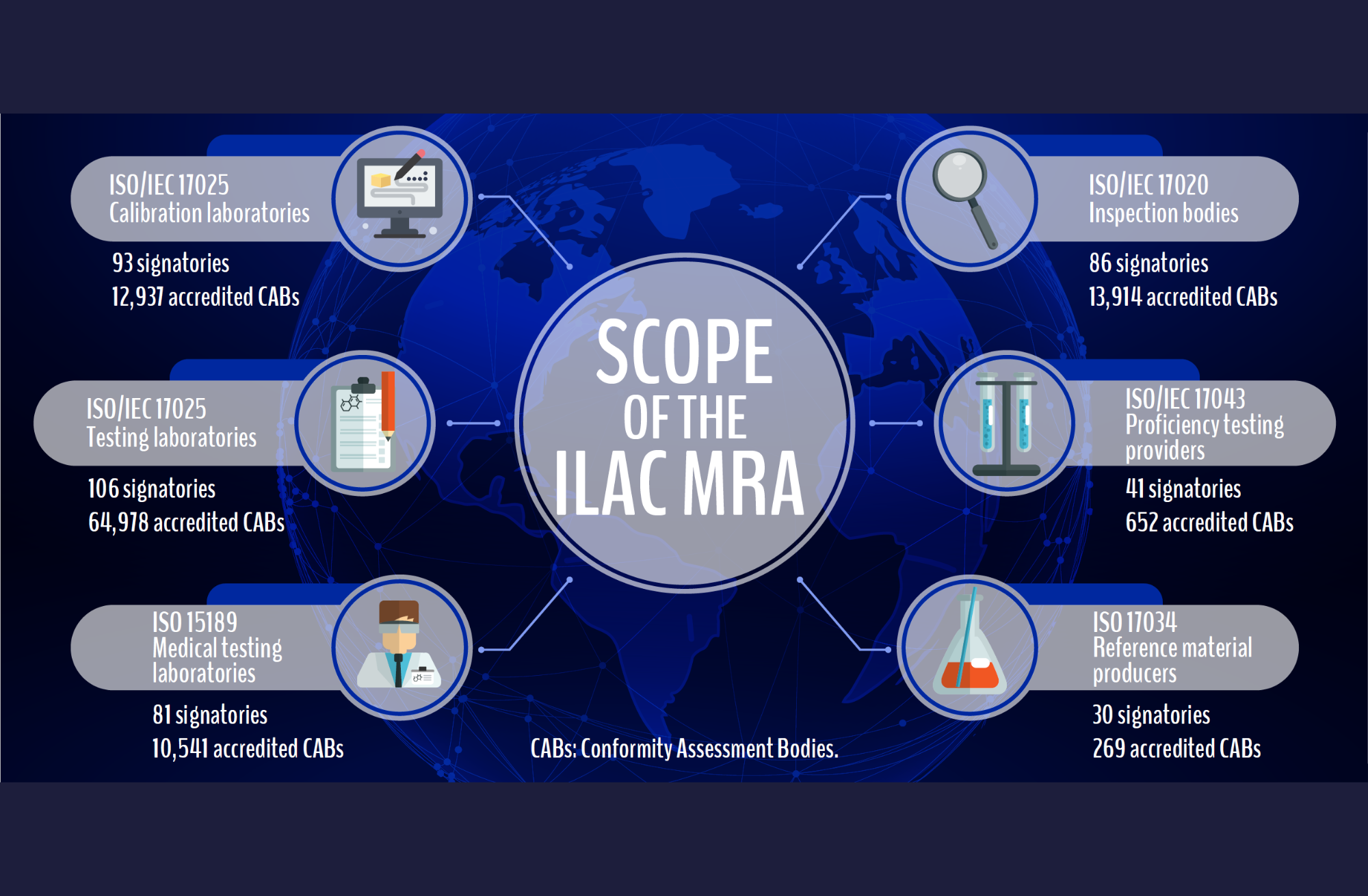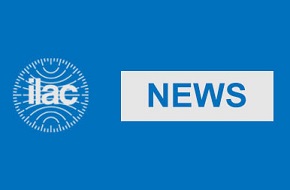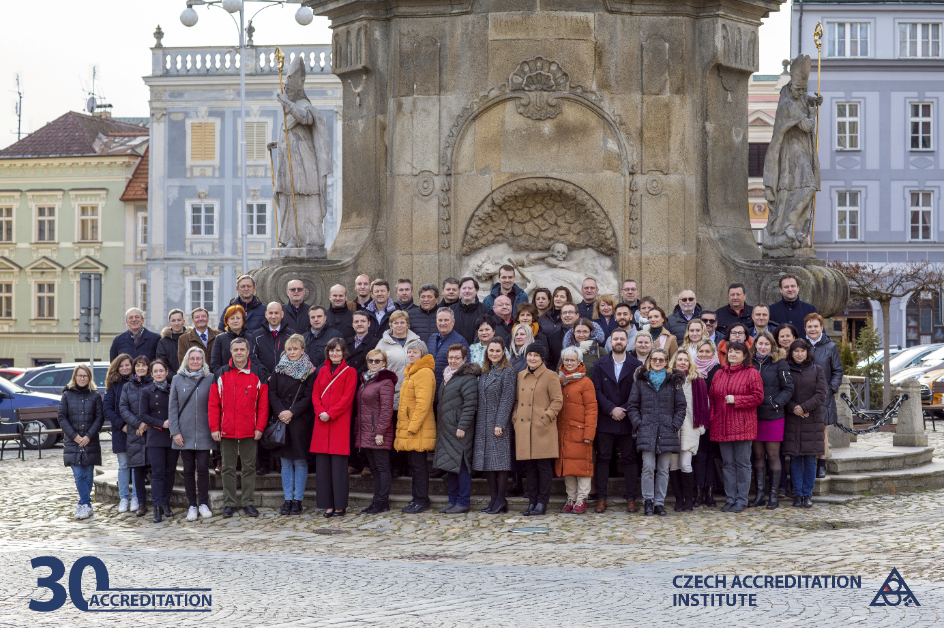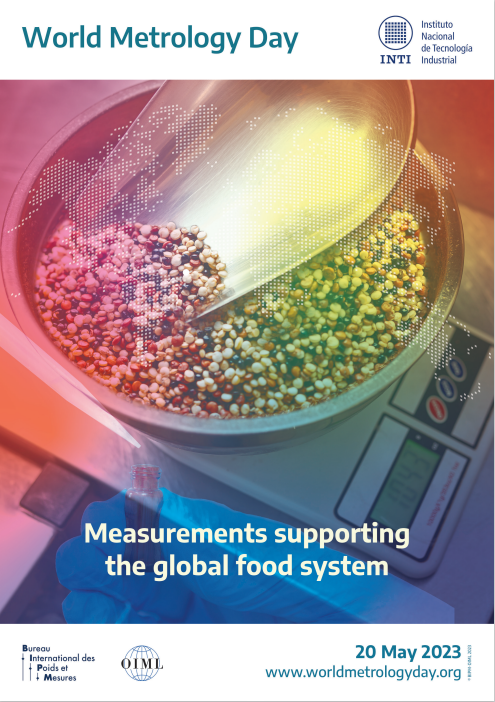
National Bureau of Agricultural Commodity and Food Standards (ACFS), Thailand, is now a Full Member of ILAC.
ACFS has become a signatory to the ILAC MRA for inspection (ISO/IEC 17020). ACFS originally joined ILAC as an Associate member on 26 May 2022 and we are now pleased to welcome ACFS as a Full Member of ILAC.
The full list of signatories to the ILAC MRA is available here.

The 2022 ILAC MRA Report and infographic is now available to download.
ILAC and its accreditation body members invest significant effort and resources to maintain the integrity and consistency of the ILAC Mutual Recognition Arrangement (MRA), also known as the ILAC Arrangement, through a peer evaluation process.
This report provides information on the activities carried out as part of the global peer evaluation process in 2022 in order to ensure that both regulators and consumers of laboratory and inspection data, as well as users of proficiency testing programs and reference materials are able to maintain confidence in the services accredited by the signatories to the ILAC Mutual Recognition Arrangement (MRA).

The signatory status of Oficina Guatemalteca de Acreditación (OGA), Guatemala, to the ILAC MRA has been re-instated effective 30 May 2023 following the suspension in March 2023. This re-instatement of the signatory status of OGA to the ILAC MRA is a result of the re-instatement of the signatory status of OGA to the IAAC MLA and in accordance with IAF/ILAC A2 Annex 7.

ILAC has now published the ILAC Assessment Procedure in the field of Telecommunications. This document is created in the framework of cooperation established under the Memorandum of Understanding (MoU) between the International Telecommunication Union (ITU) and the International Accreditation Forum (IAF) and the International Laboratory Accreditation Cooperation (ILAC).
The ITU is the United Nations specialized agency for information and communication technologies (ICTs).
The ITU maintains a register of test laboratories that are eligible to test ICT equipment against the ITU-T Recommendations in the ITU list of recognized test laboratories. The ILAC Assessment Procedure in the field of Telecommunications has been produced to inform ILAC MRA signatory accreditation bodies about the requirements that must be met by testing laboratories seeking to be registered on the ITU list of recognized test laboratories.

The IAF and ILAC Executive Committees have prepared an Invitation to tender for provision of the Secretariat for the transition from IAF and ILAC to the NEW BODY, for the period of 01 January 2024 – 31 December 2026 inclusive.
The Request for Proposal is available here. Questions should be directed to the Contractor supporting the establishment of the NEW BODY: Thomas Facklam unternehmensberatung@facklam.de. Interested service providers are invited to submit their tenders by 23:59 UTC on Sunday 25 June 2023.

The signatory status of the Accreditation Education Research and Scientific Services Center Pvt. Ltd (AERSSC), Nepal to the ILAC MRA has been withdrawn as a result of the voluntary withdrawal by AERSSC of their signatory status to the APAC MRA.
AERSSC remains an Associate member of ILAC. https://ilac.org/ilac-membership/members-by-category/

We welcome Non-Profit Association Estonian Centre for Standardisation and Accreditation (EAK), Estonia, as a Full Member of ILAC.
As EAK is a signatory to the EA MLA for the accreditation of testing laboratories using ISO/IEC 17025, medical testing laboratories using ISO 15189, calibration laboratories using ISO/IEC 17025 and inspection bodies using ISO/IEC 17020, EAK has been granted signatory status to the ILAC MRA and therefore, Full membership of ILAC.
We welcome EAK and look forward to working with our EAK colleagues.
The full list of signatories to the ILAC MRA is available here.

We are pleased to advise that ISO/IEC 17043:2023 Conformity assessment — General requirements for the competence of proficiency testing providers has now been published.
Further a resolution was endorsed at the ILAC General Assembly held in November 2022 to allow a 3-year implementation period from the date of publication of this revised standard (ie now 31 May 2026) as shown below:
ILAC Resolution GA 26.09
As the revised version of ISO/IEC 17043 is scheduled for publication in 2022 or early 2023, the General Assembly endorses the recommendation of the AIC that a transition period of 3 years from the date of publication be adopted.
At the end of the transition period, accreditation of a proficiency testing provider to ISO/IEC 17043:2010 will not be recognised under the ILAC Arrangement.
The implementation of this transition period for ISO/IEC 17043 by the signatories to the ILAC MRA for the accreditation of proficiency testing providers will be monitored by the ILAC AMC to ensure the deadline is achieved. The process used by the AMC to monitor this implementation of the revised standard will be similar to that used during the implementation of ISO/IEC 17025:2017.
We would also like to take this opportunity to thank Erik Oehlenschlaeger, ILAC AIC Chair, the members of the AIC Proficiency Testing working group and our liaison officers to the ISO WG responsible for this standard for their contributions on behalf of ILAC to the revision of this important standard for our accreditation body members and their accredited proficiency testing providers.

The Czech Accreditation Institute (CAI) was established as a national accreditation body by the Czech Republic on 1st January 1993. In January 2023, a festive meeting of CAI staff was held to celebrate the 30th anniversary. The meeting took place in the splendid surroundings of the historic town of Jindřichův Hradec, founded by the royal family of the Přemyslid in the 10th century.

Participants recalled the history of the establishment and operation of the CAI from its earliest beginnings to the present day.
In 1996 the initial peer-evaluation of CAI was undertaken and in 1998 the CAI signed the EA Multilateral Agreement (MLA) to become the first EA MLA signatory in Central and Eastern Europe and in doing so gained international recognition.

The OIML and the BIPM are pleased to announce that the 2023 World
Metrology Day Resource Website is now live:
https://www.worldmetrologyday.org/
The theme in 2023 is “Measurements supporting the global food system”.
This theme was chosen because of the increasing challenges of climate
change, and global distribution of food in a world whose population
reached 8 billion at the end of 2022.
The 2023 poster was designed in association with Sistema Interamericano
de Metrología (SIM) and the Instituto Nacional de Tecnología Industrial
(INTI), Argentina.
On the Resource Website, you may download the Press Release, the
Directors’ Message, and the poster in English and in French. The poster
may be downloaded in PDF and PhotoShop formats.
Last year’s World Metrology Day was a huge success; we hope to build on
that success in 2023.
Please help us to spread the word about World Metrology Day and let the
World Metrology Day Team know by email about the events you are
organising in your country so that we can include them on the website.
For inspiration, you can see the type of events organised by other NMIs
in previous years on the website.